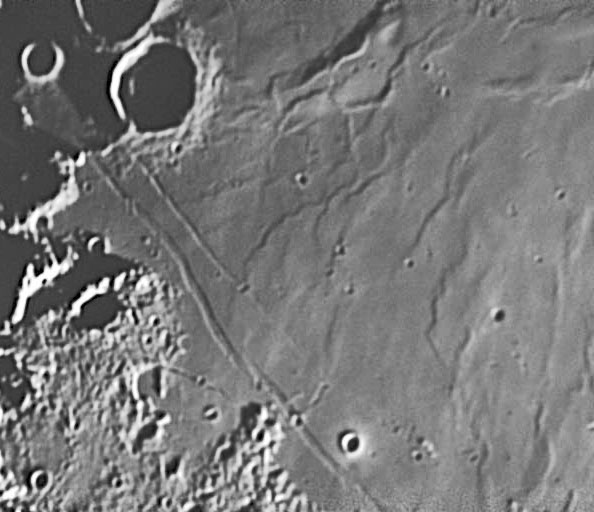Difference between revisions of "February 5, 2009"
| Line 1: | Line 1: | ||
__NOTOC__ | __NOTOC__ | ||
=Highway Interruptus= | =Highway Interruptus= | ||
| − | |||
<!-- ws:start:WikiTextHeadingRule:2:<h1> --> | <!-- ws:start:WikiTextHeadingRule:2:<h1> --> | ||
<!-- ws:start:WikiTextLocalImageRule:8:<img src="/file/view/LPOD-Feb5-09.jpg/56405454/LPOD-Feb5-09.jpg" alt="" title="" /> -->[[File:LPOD-Feb5-09.jpg|LPOD-Feb5-09.jpg]]<!-- ws:end:WikiTextLocalImageRule:8 --><br /> | <!-- ws:start:WikiTextLocalImageRule:8:<img src="/file/view/LPOD-Feb5-09.jpg/56405454/LPOD-Feb5-09.jpg" alt="" title="" /> -->[[File:LPOD-Feb5-09.jpg|LPOD-Feb5-09.jpg]]<!-- ws:end:WikiTextLocalImageRule:8 --><br /> | ||
| − | <em>image by [mailto:thefamily90@hotmail.com Jim Phillips]</em><br /> | + | <em>image by [mailto:thefamily90@hotmail.com" rel="nofollow Jim Phillips]</em><br /> |
<br /> | <br /> | ||
| − | Linear rilles are flat-floored channels usually found paralleling edges of maria. The rilles form when the center of an impact basin and the maria within it subside, causing bending cracks along the edges. No basin is completely surrounded by these rilles - they all stop at some point. Jim's low Sun view of the Hypatia Rilles show that at least one linear rille previously extended further than it now does. The bottom, longer rille is Hypatia I and the shorter rille above it is Hypatia II (rilles are designated by Roman numbers). On most [http://www.lpod.org/?m=20060826 images] II stops at the elongated crater that cuts it, but here you can see that it extended nearly to Moltke, the small bright crater at bottom center. It appears that the eastern end of II was covered by a later lava flow, but it can't be detected. Or perhaps, as the [http://www.mapaplanet.org/explorer-bin/explorer.cgi?map=Moon&layers=moon_clementine_multi&west=20.69&south=-1.58&east=26.32&north=1.23&center=23.505&defaultcenter=on&grid=none&stretch=none&projection=SIMP&advoption=NO&info=NO&resolution=128 Clementine] image suggests, the rille has been largely filled in by ray deposits (from Theophilus?).<br /> | + | Linear rilles are flat-floored channels usually found paralleling edges of maria. The rilles form when the center of an impact basin and the maria within it subside, causing bending cracks along the edges. No basin is completely surrounded by these rilles - they all stop at some point. Jim's low Sun view of the Hypatia Rilles show that at least one linear rille previously extended further than it now does. The bottom, longer rille is Hypatia I and the shorter rille above it is Hypatia II (rilles are designated by Roman numbers). On most [http://www.lpod.org/?m=20060826" rel="nofollow images] II stops at the elongated crater that cuts it, but here you can see that it extended nearly to Moltke, the small bright crater at bottom center. It appears that the eastern end of II was covered by a later lava flow, but it can't be detected. Or perhaps, as the [http://www.mapaplanet.org/explorer-bin/explorer.cgi?map=Moon&layers=moon_clementine_multi&west=20.69&south=-1.58&east=26.32&north=1.23&center=23.505&defaultcenter=on&grid=none&stretch=none&projection=SIMP&advoption=NO&info=NO&resolution=128" rel="nofollow Clementine] image suggests, the rille has been largely filled in by ray deposits (from Theophilus?).<br /> |
<br /> | <br /> | ||
| − | <em>[mailto:tychocrater@yahoo.com Chuck Wood]</em><br /> | + | <em>[mailto:tychocrater@yahoo.com" rel="nofollow Chuck Wood]</em><br /> |
<br /> | <br /> | ||
<strong>Technical Details</strong><br /> | <strong>Technical Details</strong><br /> | ||
Revision as of 19:04, 4 January 2015
Highway Interruptus

image by " rel="nofollow Jim Phillips
Linear rilles are flat-floored channels usually found paralleling edges of maria. The rilles form when the center of an impact basin and the maria within it subside, causing bending cracks along the edges. No basin is completely surrounded by these rilles - they all stop at some point. Jim's low Sun view of the Hypatia Rilles show that at least one linear rille previously extended further than it now does. The bottom, longer rille is Hypatia I and the shorter rille above it is Hypatia II (rilles are designated by Roman numbers). On most " rel="nofollow images II stops at the elongated crater that cuts it, but here you can see that it extended nearly to Moltke, the small bright crater at bottom center. It appears that the eastern end of II was covered by a later lava flow, but it can't be detected. Or perhaps, as the " rel="nofollow Clementine image suggests, the rille has been largely filled in by ray deposits (from Theophilus?).
" rel="nofollow Chuck Wood
Technical Details
Jan 31, 2009, 23:48-23:50 UT. TEC 200mm F/8 Flourite @ F/40.
Related Links
Rükl plate 35



